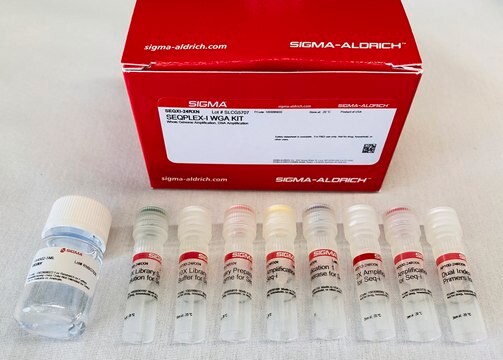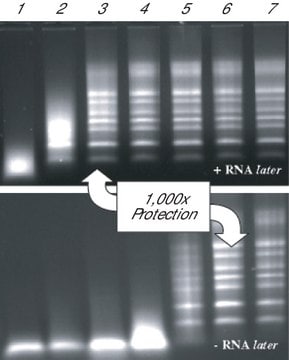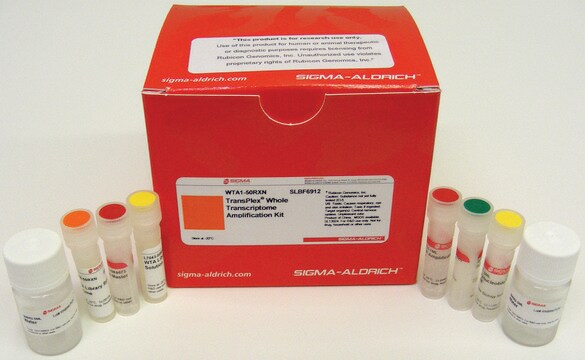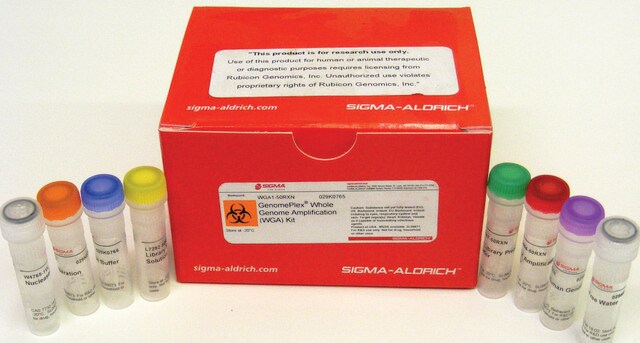Key Documents
SEQRI
SEQPLEX-I WTA Kit
Whole Transcriptome Amplification, RNA Amplification
Synonim(y):
RNA amplification kit
About This Item
Polecane produkty
metody
whole genome amplification: suitable
whole transcriptome amplification: suitable
kompatybilność
Illumina (Next Generationa Sequencing)
Warunki transportu
wet ice
temp. przechowywania
−20°C
Opis ogólny
Pre-amplification/Library Synthesis: In the Pre-amplification/Library Synthesis step using the (Library Preparation Reagents), the template RNA is reverse transcribed using primers composed of a semi-degenerate 3′- and universal 5′-ends. As polymerization proceeds, displaced and RNaseH generated single strands serve as new templates for additional primer annealing and extension producing random, overlapping cDNAs flanked by a universal primer (5′) and primer complement (3′) sequence.
Amplification 1: In the Amplified Library Synthesis step (using the Amplification 1 Reagents), products from pre-amplification/library synthesis are amplified by single primer PCR via the proprietary universal end sequence. These amplification products typically range from 200 to 500+ base pairs. Note: Amplicons from degraded RNA, such as Formalin Fixed Paraffin Embedded (FFPE), are typically shorter and dependent upon the length of the starting RNA.
Amplification 2: In the Sequencing Library Synthesis step (using Amplification 2 Reagents), single primer amplicons from amplification 1 are converted to dual Illumina® primer PCR products ready for purification, quantification, and Illumina® NGS.
Zastosowanie
Cechy i korzyści
- Amplifies fragmented/extremely small quantities of total RNA: Fragmented or intact RNA from all sources including FFPE and RIP are easily amplified by random priming technology.
- Semi-degenerate library primer design ensures more complete transcriptome coverage and efficient priming
- Fewer Steps: No need to fragment cDNA before sequencing
- High-efficiency: Amplifies ds-cDNA in 8 hours or less
- Cost-effective: No longer requires an additional NGS library prep step
- Compatible with Illumina® next generation sequencing
Inne uwagi
a) The reagents in this kit have been tested to assure that RNases are absent.
b) The user, however, must protect the integrity of experimental results by wearing basic protective equipment, including gloved hands and lab coat.
c) All reagent transfers throughout this procedure should be performed in a laminar flow hood or dedicated clean room.
d) Frozen RNA samples should be thawed on ice.
2) A 20 μL Amplification 2 reaction will produce >100 ng of amplified double-stranded cDNA when starting with 100 pg to 5 ng of high-quality RNA. Higher input quantities and higher quality RNA template generally result in increased yields. For damaged RNA, such as from FFPE, 1–50 ng input RNA is recommended.
3) The dual index adapter primers (AP100) provided in this kit will only work for one sample. If pooling samples for sequencing is required, the user must provide additional index primer sets. See example index primer sequences on page 2 of the technical bulletin.
Informacje prawne
Oświadczenie o zrzeczeniu się odpowiedzialności
Hasło ostrzegawcze
Danger
Zwroty wskazujące rodzaj zagrożenia
Zwroty wskazujące środki ostrożności
Klasyfikacja zagrożeń
Resp. Sens. 1
Kod klasy składowania
10 - Combustible liquids
Certyfikaty analizy (CoA)
Poszukaj Certyfikaty analizy (CoA), wpisując numer partii/serii produktów. Numery serii i partii można znaleźć na etykiecie produktu po słowach „seria” lub „partia”.
Masz już ten produkt?
Dokumenty związane z niedawno zakupionymi produktami zostały zamieszczone w Bibliotece dokumentów.
Powiązane treści
Znaczący postęp technologiczny sprawił, że produkcja przeciwciał monoklonalnych stała się szybsza i bardziej wydajna. Istnieją trzy ustalone platformy do odkrywania przeciwciał. Oferujemy odczynniki do produkcji bibliotek przeciwciał monoklonalnych przy użyciu każdej z tych technik.
Znaczący postęp technologiczny sprawił, że produkcja przeciwciał monoklonalnych stała się szybsza i bardziej wydajna. Istnieją trzy ustalone platformy do odkrywania przeciwciał. Oferujemy odczynniki do produkcji bibliotek przeciwciał monoklonalnych przy użyciu każdej z tych technik.
Nasz zespół naukowców ma doświadczenie we wszystkich obszarach badań, w tym w naukach przyrodniczych, materiałoznawstwie, syntezie chemicznej, chromatografii, analityce i wielu innych dziedzinach.
Skontaktuj się z zespołem ds. pomocy technicznej









